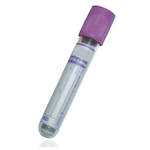Suitable Specimen Types
- EDTA Whole Blood
Specimen Transport
No special requirements.
Sample Processing in Laboratory
Place in Trace Element rack in Send Away Fridge.Sample Preparation
None requiredTurnaround Time
1 weekSample Stability
4 oC
Cadmium
General Information
Cadmium (Cd) is a byproduct of zinc and lead smelting. It is a common pigment in organic based paints and is used in the production of nickel-based rechargeable batteries and tobacco products. Breathing the fumes of acdmium vapours leads to nasal epithelial damage and pulmonary congestion resembling chronic empysema.
A common source of chronic exposure to Cd is spray painting of organic based paints without the use of a protective breathing apparatus and as such, automobile repair mechanics represent a work group that has significant oppertunity for exposure to Cd.
Toxicity of Cd resembles other metals in that it effects the kidney. Renal dysfunction with proteinuria of slow onset (over a period of years) is the typical presentation.
Patient Preparation
None
Notes
Moderately increased blood Cd may be associated with tobacco use
Urine Cd is not normally measured unless blood Cd is elevated
Reference Range
|
Cadmium (blood) (CAD) |
nmol/L |
|
Non-smokers |
<27 |
|
Smokers |
<54 |
|
Significant Exposure |
>90 |
Source, SAS Trace Element Laboratories Update 2018
